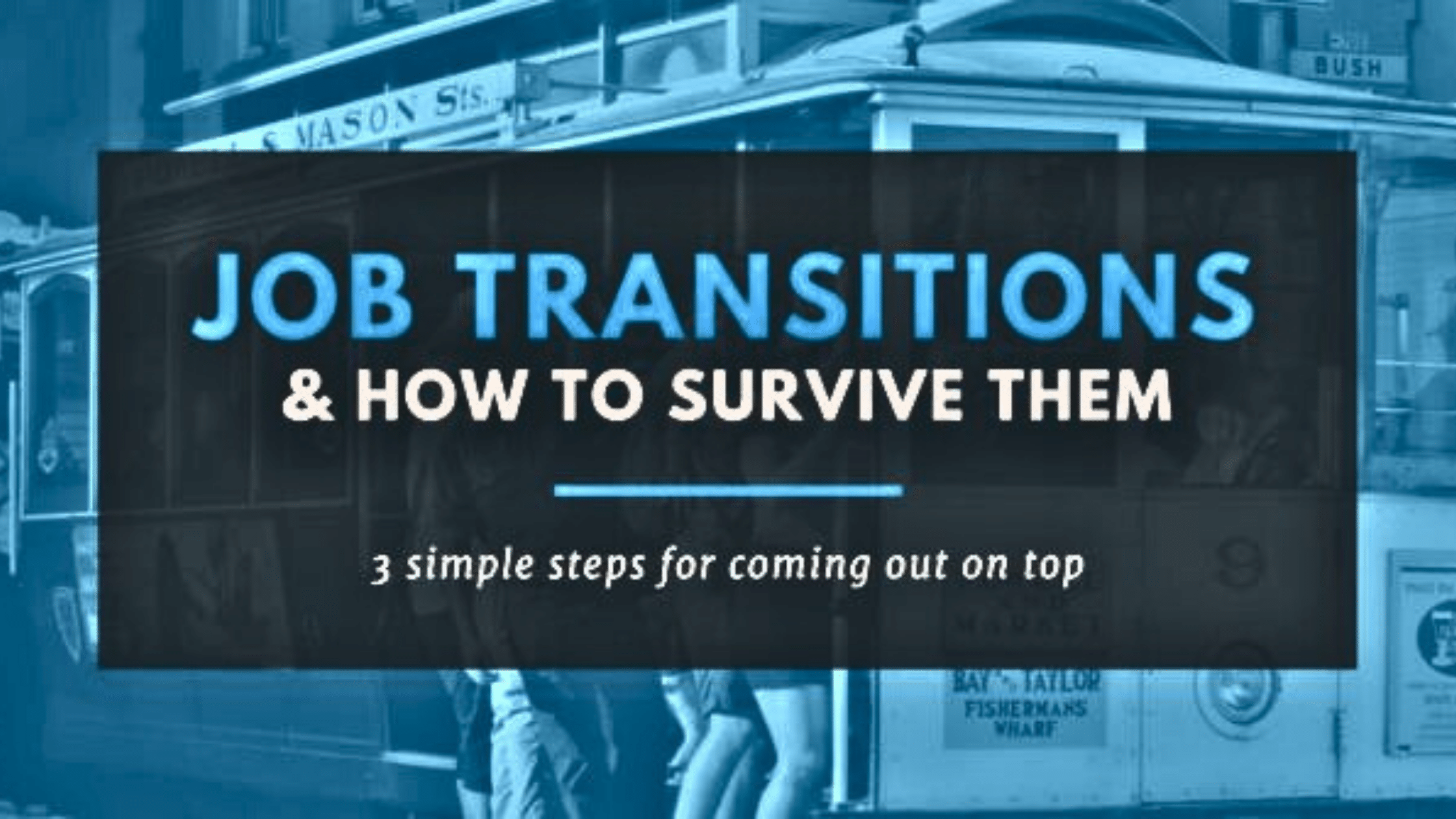Surviving a job transition can be challenging, whether you know it’s coming or not. Caught off-guard, a job transition could knock you off your feet but with preparation, job transitions can be managed much more easily. The job transition process may take anywhere from a few weeks up to several months and even more – don’t let stress get in the way of your success! Prepare yourself by following these three simple steps for surviving a job transition:
1: Create a Plan
Your odds of successfully navigating the transition process will improve dramatically with a little prior planning. While it’s true the company sometimes decides for us when it’s time to leave, sometimes we have the benefit of knowing ahead that it’s time for change. Before jumping into the deep end of the employment pool take a little time to get to know yourself a little, reflect on any previous accomplishments you’ve made, and take inventory of your resources.
- Know your personality: No two persons are alike. Everyone has unique personality traits affecting their judgment, interests, social drive and other defining characteristics – it helps a lot to know yours. Personality profiles like Meyers-Briggs and DISC are excellent, free tools for self-assessing potential career paths, overcoming communications hurdles, and much more.
- Assess your own accomplishments: An aggressive job-hunter’s market requires more than a list of where you’ve spent the last few years. Assess your individual accomplishments in the workplace – saving money, reducing waste, lowering overhead costs and other personal victories. Shape this information into an “elevator speech” – a fifteen-second sales pitch selling your skills and qualifications to potential employers.
- Plan for the long haul: Whether you find yourself transitioning by choice or not, the average job hunt lasts longer than five weeks – sometimes much longer. Planning financially will help ensure a smooth and comfortable transition. Along with sufficient finances to manage your daily expenses, ensure you own proper attire for networking and interviewing. Preparing these items ahead of time will guarantee readiness at a moment’s notice.
Even if you aren’t expecting to begin the job transition process, having a plan provides peace of mind, and will likely come into significant use should the unexpected occur.
2: Network and Connect
Networking is, and has always been, an invaluable business resource. Always at the highest levels of importance, the value of networking increases exponentially when transitioning to a new job or career. Networking meetups can be found in almost every city across the nation ranging from casual meetups to structured, members-only meetings. Successful networking means more than trading business cards and moving on to the next table. While it can be beneficial to maximize your ratio of connections-per-hour a single, meaningful business connection can prove more valuable than all others combined.
Social sites extend networking reach even further; they can be excellent tools for gathering information on current industry trends and open employment positions. If using social media as part of the job transition process it is generally good practice to withhold posting anything to your accounts you wouldn’t want a potential employer to see, regardless of privacy settings. Social media has the power to propel you forward and equal (if not greater) power to pull you back. Accounts approached with a professional mindset tend to be more successful. Updating your social media accounts with thoughtfully-written content and professional photography can help improve your reception by potential employers.
Successful networking requires more than meeting new people. The successful networker will expand their networking focus to include managing their:
- Old connections – Reach out, say “Hi”! Sending personal notes to old colleagues or friends is a wonderful way to warm up relationships which have otherwise cooled.
- Current connections – Don’t burn bridges! Take the time to shore up existing professional relationships and before transitioning on to a new position or career.
- New connections – Grow your network! Attend a networking event through a local meeting, online meetup, or just by going out and shaking hands.
Networking doesn’t need to feel like work. Business relationships can be started in the checkout line and forged at happy hour. It’s not where you meet, but who you meet. What matters most in networking isn’t where you network – it’s making valuable, beneficial, and meaningful professional connections. The more you network the better your chances of creating relationships that will help you survive – and ultimately successfully overcome – the job transition process.
3: Do the Research
Before applying to a company, or attending a job interview – do the research. More than just company history, learn about the corporate culture and what directions the company may be headed. Knowing and being comfortable with these answers can impress interviewers, and can help to alleviate pre-interview stress and anxiety by removing a few unknowns.
Know the Company: Employers expect applicants to know where it is they are applying to. Before applying or interviewing research company background, mission, and other relevant information. Most companies have all this information easily accessible on the internet, yours for the taking.
Learn the Corporate Culture: Is the office environment casual or professional? How do people dress? How do they talk to each other? Are employees punctual? Observing how a company operates at the ground-level can help you prepare everything from how to format your résumé to how and when to arrive for your interview. Companies want to know if applicants are going to fit – show them you are willing and able to.
Tailor Your Résumé: Job postings often come with a list of written requirements, desirable skills, and other traits the employer wish to see from applicants. A successful résumé will clearly feature meeting and exceeding those posted expectations. Most job postings generate hundreds of responses if not more, limiting overall exposure time for each applicant. A résumé meeting the employer’s requests can increase likelihood of surviving the initial sorting.
Performing research ahead of time will help you learn what you might expect, and how to better communicate with potential employers. A little research on the front-end can aid you in crafting a targeted résumé, successfully attending a job interview, and ultimately – landing the job.
Don’t Give Up.
These 3 steps to surviving the job transition hinge on your willingness to stick it out. A job transition is a job itself – and not one many people enjoy. Preparing ahead of time can help you transition quickly and successfully, without losing your cool in the process. The process can be lengthy, stressful, and disappointing but with the aid of a solid plan and a positive attitude, you too can survive, and be successful. At High Bluff Private Wealth, we offer financial planning services for all of life’s challenges. Contact us today to see how we can help you plan for the future, and prepare for the unexpected.
The opinions voiced in this material are for general information only and are not intended to provide specific advice or recommendations for any individual.





